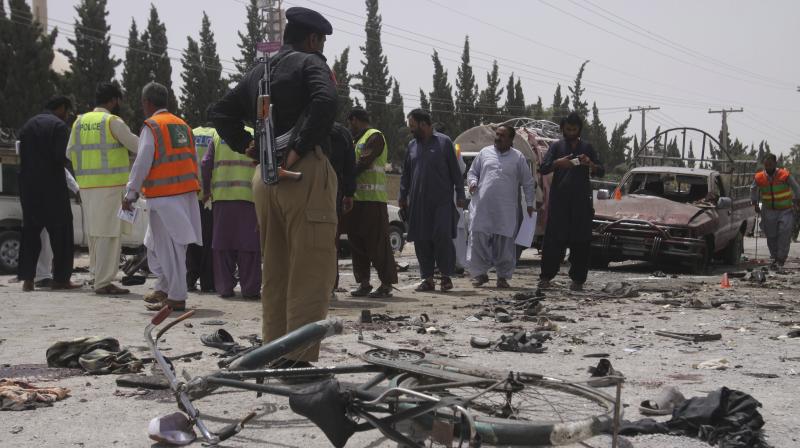Pak general elections: 31 killed in blast outside polling booth in Quetta
The attack also wounded 35 people and several were reported to be critical, raising concerns the death toll could rise further.

Islamabad: A suicide bomber struck outside a crowded polling station in Pakistan’s southwestern city of Quetta, killing 31 people as Pakistanis cast ballots Wednesday in a general election meant to lead to the nation’s third consecutive civilian government.
The attack in Quetta, the provincial capital of Baluchistan, also wounded 35 people and several were reported to be in critical condition, raising concerns the death toll could rise further, according to hospital official Jaffar Kakar, a doctor.
A witness who was waiting to cast his ballot, Abdul Haleem, said he saw a motorcycle drive into the crowd of voters just seconds before the explosion. Haleem’s uncle was killed in the explosion.
“There was a deafening bang followed by thick cloud of smoke and dust and so much crying from the wounded people,” he told The Associated Press.
Baluchistan also saw the worst violence of the election campaign earlier this month when a suicide bomber blew himself up at a political rally, killing 149 people, including the candidate Siraj Raisani. Another 400 were wounded. Voting in that constituency has been suspended
Citing security concerns, the election commission announced that internet and cell phone services in several districts in Baluchistan have been suspended. Election commission secretary Babar Yaqub told reporters late Tuesday that threats against polling stations, staff and even candidates have been received.
Hours earlier, militants lobbed grenades and opened fire at a military convoy escorting election staffers and voting material in Baluchistan’s district of Turbat, killing four troops. At the request of the election commission, Pakistan’s military is deploying 350,000 troops countrywide outside and inside polling stations.
Also on Wednesday, police said a shooting between supporters of two opposing political parties killed one person and wounded two in a village near the northwestern city of Swabi.
Early voting was heavy at some polling stations in Islamabad, the capital, and also in the Punjab provincial capital, with several political party leaders standing in line to cast their ballots. Local television reported scattered incidences of police arresting people with pre-marked ballots,
Rights groups have warned that a rancorous election campaign and widespread allegations of manipulation imperil the wobbly transition to democratic rule and raise the spectre of bitter challenges of fraud after the elections.
The unprecedented participation of radical religious groups, including those banned for terror links but resurrected and renamed, has also raised fears that the space for moderate thought may shrink further in Pakistan.
Attacks against minorities have increased in recent years.
One candidate, Jibran Nasir, an independent from Pakistan’s financial hub of Karachi, received death threats and even had a fatwa, or religious edict, issued against him after he refused to condemn Ahmadis, reviled by mainstream Muslims as heretics because they believe the messiah promised in Islam arrived over a century ago. Pakistan in 1974 declared Ahmadis non-Muslims.
“I am speaking for the millions of Pakistanis who are too afraid to confront religious bigotry,” Nasir said in a telephone interview. He also said that no arrests have been made of those who threatened him.
The leading contenders in Wednesday’s polling are former cricket star Imran Khan and his right-of-center Pakistan Tehreek-e-Insaf Party, and the right-of-center Pakistan Muslim League, the party of disgraced Prime Minister Nawaz Sharif, who is in jail serving 10 years on corruption charges. His younger brother Shahbaz Sharif took control of the party.
Khan’s supporters showered his vehicle with rose petals as he arrived to vote at a polling station near his home suburb in. Islamabad. After voting, he appealed on Pakistanis to come out and vote in huge numbers “to save future generations.”
The third-largest party in the running is the left-leaning Pakistan People’s Party, headed by Bilawal Bhutto, the son of late Prime Minister Benazir Bhutto, assassinated by Pakistan’s Taliban militants, whom she had vowed to eradicate.
Election officials say more than 11,000 candidates are vying for 270 seats in Pakistan’s law-making Lower House of Parliament and 577 seats in four provincial assemblies.

